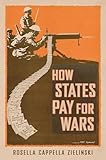How States Pay for Wars / Rosella Cappella Zielinski.
Material type: TextPublisher: Ithaca, NY : Cornell University Press, [2016]Copyright date: ©2016Description: 1 online resource (208 p.) : 3 tables, 7 chartsContent type:
TextPublisher: Ithaca, NY : Cornell University Press, [2016]Copyright date: ©2016Description: 1 online resource (208 p.) : 3 tables, 7 chartsContent type: - 9781501705960
- War finance -- History -- 19th century
- War finance -- History -- 20th century
- War finance -- Political aspects
- International Studies
- Political Science & Political History
- Finanzierung
- Geschichte
- Militärausgaben
- Kriegführung
- Finanzpolitik
- Militärökonomie
- Kriegswirtschaft
- Militärhaushalt
- POLITICAL SCIENCE / Security (National & International)
- Wars, military power, economic stability, financing, state power
- 355.622 23
- HB195 .C28 2017
- online - DeGruyter
| Item type | Current library | Call number | URL | Status | Notes | Barcode | |
|---|---|---|---|---|---|---|---|
 eBook
eBook
|
Biblioteca "Angelicum" Pont. Univ. S.Tommaso d'Aquino Nuvola online | online - DeGruyter (Browse shelf(Opens below)) | Online access | Not for loan (Accesso limitato) | Accesso per gli utenti autorizzati / Access for authorized users | (dgr)9781501705960 |
Frontmatter -- Contents -- List of Illustrations -- Preface -- Acknowledgments -- Introduction: Making Money, Making War -- 1. How States Pay for Wars -- 2. Truman and the Korean War -- 3. Johnson and the Vietnam War -- 4. Britain and Currency Reserves during World War II and the Crimean War -- 5. Taxation and Currency Reserves during the Russo-Japanese War -- 6. Confronting the Costs of War, 1823–2003 -- Conclusion: Long War Finance in Perspective -- Notes -- Bibliography -- Index
restricted access online access with authorization star
http://purl.org/coar/access_right/c_16ec
Armies fight battles, states fight wars. To focus solely on armies is to neglect the broader story of victory and defeat. Military power stems from an economic base, and without wealth, soldiers cannot be paid, weapons cannot be procured, and food cannot be bought. War finance is among the most consequential decisions any state makes: how a state finances a war affects not only its success on the battlefield but also its economic stability and its leadership tenure. In How States Pay for Wars, Rosella Cappella Zielinski clarifies several critical dynamics lying at the nexus of financial and military policy.Cappella Zielinski has built a custom database on war funding over the past two centuries, and she combines those data with qualitative analyses of Truman's financing of the Korean War, Johnson’s financing of the Vietnam War, British financing of World War II and the Crimean War, and Russian and Japanese financing of the Russo-Japanese War. She argues that leaders who attempt to maximize their power at home, and state power abroad, are in a constant balancing act as they try to win wars while remaining in office. As a result of political risks, they prefer war finance policies that meet the needs of the war effort within the constraints of the capacity of the state.
Mode of access: Internet via World Wide Web.
In English.
Description based on online resource; title from PDF title page (publisher's Web site, viewed 26. Apr 2024)


